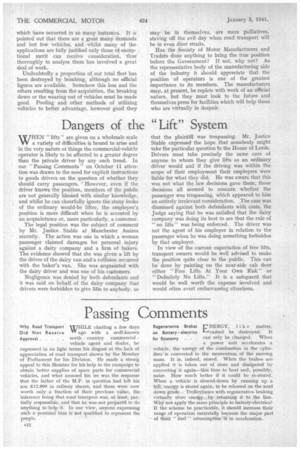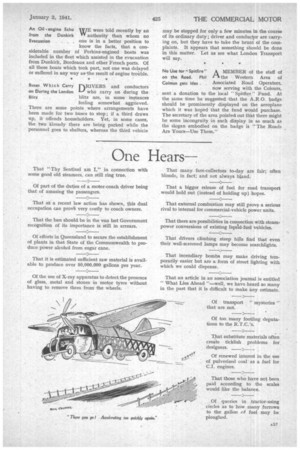Passing Comments
Page 14

Page 15

If you've noticed an error in this article please click here to report it so we can fix it.
WHILE chatting a few days ago with a ..well-known north country commercial vehicle agent and dealer, he.
expressed in no light terms his disgust at the. lack of appreciation of road transport shown by the Member of Parliament for his Division. He made a strong appeal to this Member for his help in the campaign to obtain better supplies of spare parts for commercial. vehicles, and what aroused his ire was the response that the father of the M.P. in question had left his son £12,000 in railway shares, and these were now worth only a fraction of their previous value, the inference being. that road transport was, at least, partially responsible; and that he was not prepared to do anything to help. it. In our 'view, anyone expressing such a• personal bias is not qualified to represent the
people. • • NERGY, like matter, " cannotbe destroyed. It can only be changed. When a power unit accelerates a
vehicle, the energy of the combustion in the cylinders is converted to the momentum of the moving mass. It is, indeed, stored. When the brakes are applied it is taken out of store and dissipated by converting it again—this time to heat and, possibly, noise, How much better if it could be re-stored. When a vehicle is slowed-down by running up a hill, energy is stored again, to be released on the next down grade. Trolleyhues with regenerative braking virtually store energy, by, returning it to the line. Why not apply the same principle to battery-electrics? If the schemebe practicable, it should increase their range of operation materially because the major part of their ' fuel" consumption is in acceleration.
An Oil engine Echo were told recently by an from the Dunkirk authority than whom no Evacuation . . . one is in a better position to know the facts, that a considerable number of Perkins-engined boats was included in the fleet which assisted in the evacuation from Dunkirk, Bordeaux and other French ports. Of all these boats which took part, not one was delayed or suffered in any way as-the result of engine trouble.
Buses Which Carry nRIVERS and conductors on During the London Li who carry on during the
Blitz . . blitz are, in some instances feeling somewhat aggrieved. There are some points where arrangements have been made for two buses to stop ; if a third draws up, it offends householders. Yet, in some cases, the two already there are being parked while the personnel goes to shelters, whereas the third vehicle
may be stopped for only a few minutes in the course of its ordinary duty ; driver and conductor are carrying on, but they have to take the brunt of the complaints. It appears that something should be done in this matter. Let us see what London Transport will say.
No Use for "Spitfire" A MEMBER of the staff of on the Road. Phil ri the Western Area of Colman gets Idea . . Associated Road Operators,
now serving with the Colours, sent a donation to the local " Spitfire " Fund. At the same time he suggested that the A.R.O. badge should be prominently displayed on the aeroplane which it was hoped that the fund would purchase. The secretary of the area pointed out that there might be some incongruity, in such display in as much as the slogan embodied on the badge is "The Roads Are Yours—Use Them."




















































